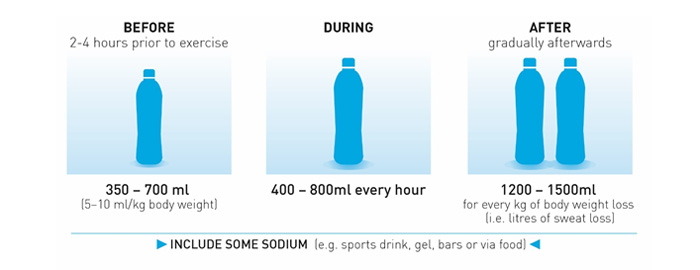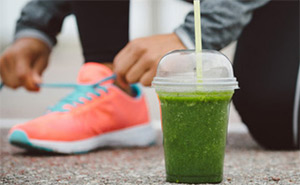Good nutrition is essential to support an active lifestyle. Those who do a lot of sports or exercise have different nutritional needs compared with those who are less active.
Here, we look at three key areas where an athlete or regular gym-goer’s nutritional needs differ from those of the general population: carbohydrates, protein and hydration.
Carbohydrates
Carbohydrates are generally considered to be the main fuel for sports and exercise as they provide energy at a faster rate compared with fat. Carbohydrates also fuel the brain and central nervous system, and they also allow for protein to be used for purposes other than energy, such as protein synthesis (the process through which muscles are repaired, replenished and rebuilt).
The recommended daily carbohydrate intake depends on a person’s bodyweight and the intensity of the exercise being done.
| Exercise | Exercise examples | Carbohydrate Targets |
|---|---|---|
| Light |
Low intensity or skill-based activities: Yoga, pilates, walks and short hikes |
3-5g/kg of bodyweight (for the average person: 210g to 350g per day) |
| Moderate |
Moderate exercise programme (e.g. 1-3 hours per day): Jogging, brisk walking, general gym workout, swimming, cycling |
5-7g/kg of body weight (for average person: 350g to 490g per day) |
| High |
Enduring program , (e.g. 1-3 hours per day moderate-to-high intensity): Cross-fit, high-intensity interval training, running, long-distance swimming, mountain biking |
6-10g/kg of body weight (for average person: 420g to 700g per day) |
| Very high |
Extreme commitment (e.g. >4-5h/d moderate to high-intensity exercise): Training for ultra-endurance events such as marathons |
8-12g/kg of body weight (for average person: 560g to 840g per day) |
Consuming carbohydrates in the few hours immediately preceding a game, competition or training session – often referred to as “carb loading” – can help improve performance by maximising energy stores.
The low-carb athlete: train low, compete high
An emerging trend is the low-carb diet, referred to as “train low, compete high”, where athletes exercise for shorter durations or at lower intensity with low stores of carbohydrate in the body.
The goal is to get the muscles adapted to the low availability of carbohydrates. So when the athlete then carries out high-intensity or longer duration sessions/competitions with adequate carbohydrate stores, his/her body – in theory – responds in a heightened way to the greater availability of carbohydrates, resulting in a better performance.
Strategies for reducing carbohydrate intake can include: fasting, protein diets or training without refuelling (or first thing in the morning, known as “fasted cardio” or “sleep low”).
However, while there is some evidence that this approach can alter the body’s metabolism, there is no clear evidence regarding its effects on performance. Caution is therefore advised before adopting a low-carb approach to sports due to possible negative effects on health, training and performance.
Protein
Protein is essential for repairing, replenishing and rebuilding muscle. And since large amounts of sports and exercise put your muscles under high levels of strain, those who live a very active lifestyle require more protein than the general population.
The average protein requirement for sedentary men and women aged 19-59 is approximately 56g/day and 45g/day, respectively. Sports nutritionists recommend that regular exercisers eat between 90-150g/day (men) and 72-120g (women) of protein.
Regarding the type of protein an active person should consume, animal proteins – especially dairy and egg – are generally more effective at rebuilding muscle than plant protein and they are better researched, too. However, given growing sustainability concerns, more research is going into plant and other proteins. In the future, we may see more fortified plant proteins or foods containing a mix of different types of proteins for optimum benefit. In the meantime, some people may be willing to forfeit the benefits of animal protein in support of sustainability.
Hydration
Insufficient hydration can negatively affect sports performance: anyone undertaking exercise should always be fully hydrated prior to starting, take on enough liquid during exercise to avoid excessive dehydration and replace any losses once finished. At the same time, it is important not to overhydrate – gaining weight during exercise could be a sign that this is the case.
The amount of fluids a person needs depends on their body composition, sweat losses, the temperature or humidity level, the type of exercise and the opportunities to rehydrate during the exercise. If the exercise continues over an extended time, or if the person tends to sweat a lot, they should consume sodium (e.g. via a sports drink or food) as they exercise, and in all cases, afterwards.
The role of sports nutrition products
Those leading a sporty lifestyle can, by and large, meet their specific nutritional needs by consuming everyday food and drinks. However, sports nutrition products – such as sports drinks, protein bars or supplements – can assist where this is not practical or if wishing to target certain nutrients.
Fast-acting carbohydrates can be incorporated into sports nutrition products to aid performance. Glucose syrups and maltodextrin, for example, provide a steady supply of energy and are more easily digested than pure glucose.
Products that include a mix of glucose and fructose, or of fructose and maltodextrin, can be more effective than those that include just one or the other. This is because each of them uses a different transporter in the gut, allowing the body to absorb the energy more efficiently and with less risk of gastric discomfort.
As an alternative to glucose and maltodextrin, carbohydrates with a low glycaemic index (GI), e.g. fructose and soluble fibre, can be added to sports nutrition products. In theory, low GI carbohydrates provide a slower and more sustained supply of energy – but more research is needed to assess the impact of this on performance.
Finally, it is not uncommon for athletes to suffer from gastrointestinal problems. One of the reasons may be that, during exercise, blood flow is diverted to more metabolically active tissues (i.e. muscles, skin). The effects of this on the gut are intensified by dehydration. In the long term, this can lead to chronic inflammation and increased gut permeability (or “leaky gut”). Adding easily digestible fibres, such as PROMITOR® soluble fibre, to sports nutrition products is a way to also support gut health.
By taking into account the specific nutritional needs of athletes and including the right combination of ingredients and nutrients as discussed here, sports nutrition products can be a useful aid for athletes and those who exercise frequently, when consumed as part of a healthy, balanced diet.
Related article:
A look inside the sports nutrition market – what are the latest consumer trends?



